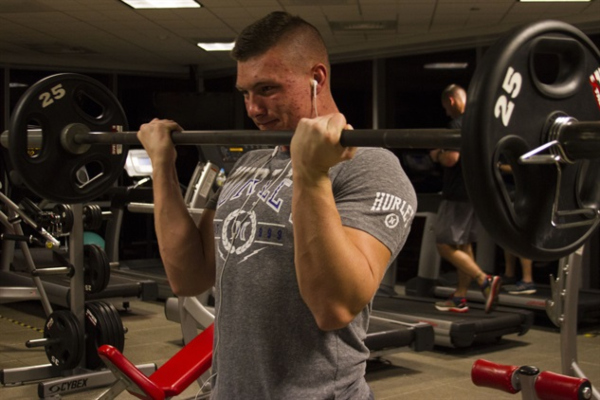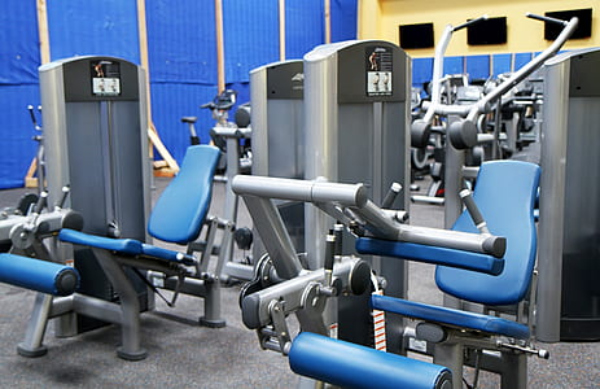Serving the country in the U.S. Armed Forces is an honor and commitment unlike any other in the world.
However, before you enlist you must meet physical fitness requirements.
This goes for every branch, including the Army, Navy, Marine Corps, Air Force, and Space Force.
The military enforces strict physical fitness and weight standards because they require soldiers to excel in peak condition.
Consequently, you may need to lose weight before you join a military branch.
Here is a guide to how to join the military if you’re overweight.
Special Note (Ages 18+ ONLY): If you’re a bit on the overweight side and are looking for some help to drop that weight quickly, check out a pill called Instant Knockout if you’re a guy, or Hourglass Fit Female Fat Burner if you’re a girl.
They are both highly effective fat-burning supplements that will help you not only shed the weight quickly but also provide motivation for your workouts.
Can I join the military if I’m overweight/obese?

Obesity is a significant problem in the United States.
According to the NIH, 23% of youth and teens are obese in America compared to just 10% in 1987.
Furthermore, according to the Center of Disease Control and Prevention (CDC), 1 in 3 young adults between the age of 17-24 are “unfit for service”.
You are not alone if you are seeking to join the military yet struggle with obesity.
There are many ways you can still join the military if you are overweight.
It’s true that every branch of the U.S. Armed Forces has height and weight standards for enlistment.
(Note: Click Here for links to the height and weight standards for each branch.)
Every military branch treats its recruits slightly differently, however, you generally need to meet height restrictions.
On the other hand, the military branch may provide a waiver for your weight if you are obese yet pledge to shed the extra weight before the completion of boot camp.
While the U.S. Armed Forces do grant a waiver (approximately 20% of new recruits need one for boot camp) for being overweight, it’s not something you should count on for service.
Instead, you should focus on getting into shape and losing weight as soon as possible.
Exercising and losing weight before boot camp will make the experience at basic training far more enjoyable.
Basic military training pushes you to your limits which makes being in shape all the more important if you are taking your military career seriously.
Related Article – How To Lose Weight For The Military: Your 30-Day Plan
How can I join the military if I’m overweight?

Did you know that 1 in 4 new recruits are disqualified from service because of weight-related issues?
Losing weight is critical to your long-term health as well as having a fulfilling career in the military.
Fortunately, you can still qualify for service by making weight before you arrive for boot camp.
If you do not, you’ll have to rely on a medical waiver which is only granted to about 20% of new applicants for weight-related issues.
The objective is to lower your Body Mass Index (BMI).
The CDC measures obesity based on the body mass index system.
You may calculate your BMI by using the formula: BMI = kg/m2
The BMI formula calculates your weight (kg) and divides by your height (in meters).
Your goal is to have a healthy BMI between the range of 18.5-24.9.
Meanwhile, any BMI reading that is above 25 qualifies you as being overweight* and therefore you should attempt to lose weight prior to service.
The best way to lose weight is an effective combination of exercise, dieting, and nutritional supplements.
Learn more about how to lose weight by following our simple 3-Step Weight Loss Approach, below:
*NOTE: A BMI calculation of 30 or higher indicates that you are obese and weight loss exercises are encouraged even more prior to enlistment.
Related Article: Can You Join The Military With Asthma?
30-Day Workout Plan
You can lose weight in as little as 30 days with the right workout plan.
30-day workout plans are popular because you start seeing results immediately while the exercises slowly pick up reps and degree of difficulty.
It’s critical not to overdo it the first couple of weeks in order to avoid injury if you do not already exercise routinely.
Most experts recommend exercising for 30 minutes a day, or a minimum of 3-4 days per week.
If you are significantly overweight, start first with light walking exercises before eventually progressing to jogging/running exercises.
Losing weight is a combination of dieting, exercising, and taking supplements.
This 30-day workout plan can get you started on the right path:
Week One:
Monday: Full-Body Workout (Endurance)
- Barbell Back Squat: 2 sets of 12 to 15 repetitions
- Lat Pulldown: 2 x 12 – 15
- Lying Leg Curl: 2 x 12 – 15
- Dumbbell Bench Press: 2 x 12 – 15
- Hanging Knee Lift: 3 x 8 – 10
Tuesday: Cardiovascular Training
- Push-Ups: 5
- Jump Squats: 10
- Pull-Ups: 5
- Side Lunges: 10
- Mountain Climbers: 20
- Sprints: 5 seconds
Wednesday: Rest Day
- Spend the day focusing on your nutritional goals including calorie counting, meal planning, and meal preparation.
- Strive to get seven to nine hours of sleep.
- Drink plenty of water: the more active you are, the more water you need.
Thursday: Full-Body Workout (Endurance)
- Barbell Bench Press: 2 sets of 12 to 15 repetitions
- Romanian Deadlift: 2 x 12 – 15
- Pull-Ups: 2 x 5 – 10
- Dumbbell Sumo Squat: 2 x 12 – 15
- Woodchopper: 3 x 8 – 10
Friday: Cardiovascular Training
Spend 30 to 45 minutes performing a cardiovascular exercise of your choice. Here are some ideas:
- Jogging / Running
- Biking
- Swimming
- Hiking
- Yoga
Saturday: Rest Day
- Spend the day focusing on your nutritional goals including calorie counting, meal planning, and meal preparation.
- Strive to get seven to nine hours of sleep.
- Drink plenty of water: the more active you are, the more water you need.
Sunday: Cardiovascular Training
- Begin with a 10 to 15-minute warm-up and stretching session
- Jog / Sprint Combos: For this exercise, you’ll base everything in one-minute increments
- Jog for 55 seconds then sprint for 5 seconds.
- Repeat
Week Two:
Monday: Full-Body Workout (Muscle Growth)
- Barbell Back Squat: 3 sets of 10 to 12 repetitions
- Lat Pulldown: 3 x 10 – 12
- Lying Leg Curl: 3 x 10 – 12
- Dumbbell Bench Press: 3 x 10 – 12
- Hanging Knee Lift: 3 x 8 – 10
Tuesday: Cardiovascular Training
- Push-Ups: 6
- Jump Squats: 10
- Pull-Ups: 6
- Side Lunges: 10
- Mountain Climbers: 20
- Sprints: 7 seconds
Wednesday: Rest Day
- Spend the day focusing on your nutritional goals including calorie counting, meal planning, and meal preparation.
- Strive to get seven to nine hours of sleep.
- Drink plenty of water: the more active you are, the more water you need.
Thursday: Full-Body Workout (Muscle Growth)
- Barbell Bench Press: 3 sets of 10 to 12 repetitions
- Romanian Deadlift: 3 x 10 – 12
- Pull-Ups: 3 x 10 – 12
- Dumbbell Sumo Squat: 3 x 10 – 12
- Woodchopper: 3 x 8 – 10
Friday: Cardiovascular Training
Spend 30 to 45 minutes performing a cardiovascular exercise of your choice. Here are some ideas:
- Jogging / Running
- Biking
- Swimming
- Hiking
- Yoga
Saturday: Rest Day
- Spend the day focusing on your nutritional goals including calorie counting, meal planning, and meal preparation.
- Strive to get seven to nine hours of sleep.
- Drink plenty of water: the more active you are, the more water you need.
Sunday: Cardiovascular Training
- Begin with a 10 to 15-minute warm-up and stretching session
- Jog / Sprint Combos: For this exercise, you’ll base everything in one-minute increments
- Jog for 55 seconds then sprint for 5 seconds.
- Repeat
Week Three:
Monday: Full-Body Workout (Strength)
- Barbell Back Squat: 4 sets of 6 to 8 repetitions
- Lat Pulldown: 4 x 6 – 8
- Lying Leg Curl: 4 x 6 – 8
- Dumbbell Bench Press: 4 x 6 – 8
- Hanging Knee Lift: 4 x 6 – 8
Tuesday: Cardiovascular Training
- Push-Ups: 7
- Jump Squats: 10
- Pull-Ups: 7
- Side Lunges: 10
- Mountain Climbers: 20
- Sprints: 9 seconds
Wednesday: Rest Day
- Spend the day focusing on your nutritional goals including calorie counting, meal planning, and meal preparation.
- Strive to get seven to nine hours of sleep.
- Drink plenty of water: the more active you are, the more water you need.
Thursday: Full-Body Workout (Strength)
- Barbell Bench Press: 4 sets of 6 to 8 repetitions
- Romanian Deadlift: 4 x 6 – 8
- Pull-Ups: 4 x 6 – 8
- Dumbbell Sumo Squat: 4 x 6 – 8
- Woodchopper: 4 x 6 – 8
Friday: Cardiovascular Training
Spend 30 to 45 minutes performing a cardiovascular exercise of your choice. Here are some ideas:
- Jogging / Running
- Biking
- Swimming
- Hiking
- Yoga
Saturday: Rest Day
- Spend the day focusing on your nutritional goals including calorie counting, meal planning, and meal preparation.
- Strive to get seven to nine hours of sleep.
- Drink plenty of water: the more active you are, the more water you need.
Sunday: Cardiovascular Training
- Begin with a 10 to 15-minute warm-up and stretching session
- Jog / Sprint Combos: For this exercise, you’ll base everything in one-minute increments
- Jog for 55 seconds then sprint for 5 seconds.
- Repeat
Week Four:
Monday: Full-Body Workout (Power)
- Barbell Back Squat: 5 sets of 3 to 5 repetitions
- Lat Pulldown: 5 x 3 – 5
- Lying Leg Curl: 5 x 3 – 5
- Dumbbell Bench Press: 5 x 3 – 5
- Hanging Knee Lift: 5 x 3 – 5
Tuesday: Cardiovascular Training
- Push-Ups: 8
- Jump Squats: 10
- Pull-Ups: 8
- Side Lunges: 10
- Mountain Climbers: 20
- Sprints: 10 seconds
Wednesday: Rest Day
- Spend the day focusing on your nutritional goals including calorie counting, meal planning, and meal preparation.
- Strive to get seven to nine hours of sleep.
- Drink plenty of water: the more active you are, the more water you need.
Thursday: Full-Body Workout (Power)
- Barbell Bench Press: 5 sets of 3 to 5 repetitions
- Romanian Deadlift: 5 x 3 – 5
- Pull-Ups: 5 x 3 – 5
- Dumbbell Sumo Squat: 5 x 3 – 5
- Woodchopper: 5 x 3 – 5
Friday: Cardiovascular Training
Spend 30 to 45 minutes performing a cardiovascular exercise of your choice. Here are some ideas:
- Jogging / Running
- Biking
- Swimming
- Hiking
- Yoga
Saturday: Rest Day
- Spend the day focusing on your nutritional goals including calorie counting, meal planning, and meal preparation.
- Strive to get seven to nine hours of sleep.
- Drink plenty of water: the more active you are, the more water you need.
Sunday: Cardiovascular Training
- Begin with a 10 to 15-minute warm-up and stretching session
- Jog / Sprint Combos: For this exercise, you’ll base everything in one-minute increments
- Jog for 55 seconds then sprint for 5 seconds.
- Repeat
30-Day Diet & Nutrition Plan
In addition to exercising daily, you should also alter your eating habits.
Nutrition is incredibly productive to weight loss and healthy living.
The goal is to reduce foods that contain high volumes of sugar, salt, or fats.
The same principles of eating as many fruits and vegetables that you learned from your mother still apply to weight loss techniques.
Nutrition always plays a vital role in athletic performance and mental stamina, two aspects you’ll want to utilize during your time in the military.
Additionally, eating properly not only provides energy throughout the day but helps develop lean muscle.
When you eat smart you can lower the risk of deadly chronic diseases like heart problems and some cancers.
According to the Dietary Guidelines for America, prospective recruits should consider the following diet:
- Focus on eating high volumes of fruits, vegetables, whole grains, and low-fat/fat-free milk.
- Consume lean meats like poultry and fish in addition to nuts, beans, and eggs.
- Reduce your daily consumption of saturated fats, cholesterol, salt, trans fat, and sugar.
In the end, the primary separation between losing weight and not losing weight is your calorie consumption vs. output.
You need to consume calories to build energy for your body, however, the goal is to burn more calories in a day than you consume.
Extra calories that are not burned off through exercise eventually transform into fat cells.
As a result, the best way to maintain a healthy weight is by managing calories in vs. calories out.
Supplements
Exercise and nutrition are the two most important aspects of losing weight.
However, you can get additional support by considering taking supplements.
Health supplements are available for many different reasons, from losing weight to adding muscle.
Instant Knockout, for example, is one of the leading weight loss supplements on the market.
The revolutionary shredding formula creates a whole body burn needed to reach weight loss goals quicker.
The solution works by boosting your metabolic rate while reducing hunger and cravings.
It also increases energy levels so you can work out more thoroughly.
Former users particularly rave about the supplement’s ability to reduce stomach fat.
Instant Knockout is developed by MMA fighters and professional boxers so you might want to give it a try.
You can read our full review of Instant Knockout for men, and LeanBean (for women).
Alternatively, you can visit their websites via the links below:
Instant Knockout – www.InstantKnockout.com
Hourglass Fit – www.HourglassFit.com
Conclusion

“How do I join the military if I’m overweight?”
Operation Military Kids receives the question often.
You can still serve the U.S. Armed Forces if you are obese by receiving a medical waiver.
Approximately 20% of new recruits need a waiver for their weight to attend boot camp.
However, those that receive a waiver must lose weight and reach minimum requirements prior to the end of boot camp to continue training.
Additionally, the military does have the right to deny any new applicant service, which means that you should work now, not later, to lose weight!
Related Article – Military Diet Review: My 7 Day Results On The 3-Day Diet
Weight / Height Requirements
Click on a branch below to see the height and weight standards for that branch:
- Replacing Dog Tags: 6 Things You Need to Know - June 28, 2024
- Navy OAR Test Study Guide - June 24, 2024
- 10 Best Sniper Movies of all Time - June 20, 2024
Originally posted on August 5, 2020 @ 1:21 pm
Affiliate Disclosure: This post may contain affiliate links. If you click and purchase, I may receive a small commission at no extra cost to you. I only recommend products I have personally vetted. Learn more.

